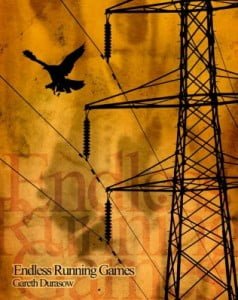Review: Gareth Durasow’s Endless Running Games
May 30, 2015
Gareth Durasow’s new poetry collection, Endless Running Games, is a delight, teetering on the edge of being a guilty pleasure, so informed is it by those great modern time wasters – computer games, the internet, and many other aspects of popular culture. Durasow, however, uses to great effect the technique of being serious about (ostensibly) frivolous things, and frivolous about the apparently serious.
Even the epigraphs straddle this borderline, with one from American poet, John Berryman, and the other from ex-Top Gear presenter, Jeremy Clarkson. The latter is particularly striking. Its statement, ‘I’m afraid to eat sandwiches I’ve made myself because they always have blood in them’ is changed by the context from what, I presume, is a statement of domestic incompetence, to something far more sinister.

[Image: Mike Barrett]
The collection is divided into three parts, opening with Games with the Dead, in which figures from (relatively) high culture and history stand alongside those from computer games and movies. The Aubrey Beardsley Colouring Book, the delightfully named opening poem, re-imagines the black-and-white works of a canonical artist as something to be coloured in, though presumably not by a child: the poem picks up the baton from Clarkson’s quote, with its own bloody epigraph and not just a reminder of the inherent violence of many of Beardsley’s images, but also of his early death from tuberculosis.
Prayer for Edward Kenway follows, apostrophising the protagonist of Assassin’s Creed IV, one of the free-running and – theoretically – endless games that give the collection its title. This is a powerfully impressionistic poem, playing with the nature of the game and the status of the characters: “It’s in their code to be game, / an earthquake padlocked / onto my heart”. It also concludes with the high seriousness of the gamer, “Take as long as you like at your bookcase, / take an Odyssey.”
There are a surprising number of Prayers for… in this section, though it’s hard to detect anything holy about most of them. Captain Ahab, Anakin Skywalker and various characters under the Tarantino-riffing Inglarious Bostards heading all get the prayer treatment. There are also two love poems, with Love Poem from Garry Kasparov hinting at later innovations and jeux d’esprit. What I read as the desire of the chess champion to meet his computerised opponent in the flesh, is presented in formatted computer code. My favourite, though, is Love Poem for Ellen Ripley, where the Alien addresses Sigourney Weaver’s character with the words:
From some kind of crawl-space
I want you between my innermost lips
to lift you by the lapels irrevocably into a vent shaft
where a cameraman lies on his belly, dying to see
what an intermittent blip looks like in the flesh.
The second section, a series of mostly untitled fourteen-line poems, would risk triggering my aversion to almost-sonnets, but diverts my ire by the modest Notes for Future Sonnets title. This is a much more personal sequence.
Though he opens it with a line from H P Lovecraft, it progresses with a sense of tenderness, but one that is ambiguously undercut by the threat of the return of games-type violence (a deadly can of Rubicon, the loss of limbs, a visit to the dentist re-envisaged as a confrontation between He-Man and Skeletor…) or more everyday betrayals, like that of an immigrant lover grassed up for bootlegging DVDs. Particularly effective are the generational conflict / affection of “We affront our dads and their razor of choice”, and the knock-off psychedelia of “The night we wore our 3D glasses home”.
However, the bravura third section, Games with the Living, is where the collection really hits its stride, fizzing and plinking with a whole games console-worth of energy and invention. There are control keys, torn pages and incomplete texts, internet searches and mail order bride spam scams. In the case of the latter, From a Prospective Russian Bride, context is once again all, as the rearrangement of the clichés of on-line seduction into poetic form restores a touching innocence to lines like:
It is never too late to fall in love
to socialise as it helps me understand life,
to travel as it broadens me out.
Further reference to Nigerian inheritance scams (“the only surviving son of the late lieutenant colonel J Garang Hinga”) only add to the sly charm.

[Image: Stephanie Beever]
For me, though, the tour de force is She Waits in Google, where once again, the ostensibly mundane listing of search results from Google, starting with the phrase “she waits” throws a skewed but revealing light on contemporary culture, as well as containing a wealth of pathos:
she waits for me to call
she waits for me to text her
to text or not to text her
what to text her after a date
what to text her when she doesn’t reply
what to text her the next day
what to text her to make her laugh
what to text her to get her back
A similar wait also occurs in IMDB, where a cine-quiz night of plot synopses builds up to a history of movies in a single life.
Appropriately, the collection closes with the gamer apocalypse of TRIHAYWBFRFYH, where capitalised instructions depict the end of days in the Rapture. “There Is Nothing In The Rapture You Can Left-Click To Death”, it warns. Despite all the affection for and immersion in games and the other trappings of popular culture displayed in these poems, there is a sense that real life (whatever that might be) cannot be put off indefinitely:
There Is So Much Out There We Can Stroll Towards
In Our Own Time, At Our Own Pace
On a Day Like Today
But Without The Rapture
Lyrical and urgent, innovative but never just for novelty’s sake, Endless Running Games left me breathless – frequently at the back-lit, pixelated pace it maintains, but more often at its sheer quality.
Mike Farren
Endless Running Games from Dog Horn Publishing can be purchased here
Follow Gareth Durasow on Twitter @garethdurasow




Comments